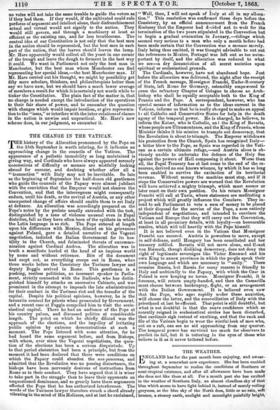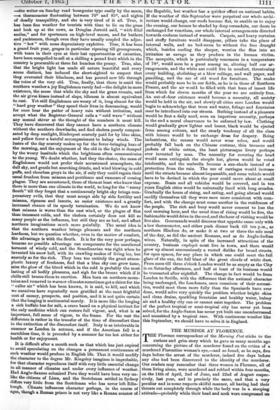THE WEATHER.
ENGLAND has for the past month been enjoying, and swear- ing at, a somewhat new experience. She has been enabled throughout September to realize the conditions of Southern or semi-tropical existence, and after all allowances have been made she does not like them at all. For a month past she has exulted in the weather of Southern Italy, an almost cloudless sky of that blue which seems to have light behind it, instead of merely veiling greyness, as the blue sky of the North does, little or no rain, soft breezes, a steamy earth, sunlight and moonlight painfully bright, —the writer on Sunday read bourgeoise type easily by the moon, —a thermometer fluctuating between 70° and 85°, and nights of deadly tranquillity, and she is very tired of it all. True, it has been fine weather for tourists with time to lie on the grass and look up at the cows, as Douglas Jerrold said, "with filial ensiles," and for sportsmen on high-level moors, and for bathers and yachtsmen, though even they have usually coupled the adjec- tive " hot " with some depreciatory expletive. True, it has been a grand fruit year, grapes in particular ripening till greengrocers, with tears in their eyes at their lost opportunities of extortion, have been compelled to sell at a shilling a pound fruit which in the country is procurable at three fat bunches the penny. True, also, that the bright light has made all nature beautiful and every scene distinct, has induced the short-sighted to suspect that they overrated their blindness, and has poured new life through the veins of the very old. True, finally, that there is amid the southern weather a joy Englishmen rarely feel—the delight in mere existence, the sense that while the sky and the grass remain, and the air gives kisses instead of slaps, idleness is almost equivalent to rest. Yet still Englishmen are weary of it, long almost for the "hard grey weather" they spend their lives in denouncing, would for once hear the patter of heavy rain without irritation, and accept what the Registrar-General calls a "cold wave" without any mental shiver at the thought of the numbers it must kill. They have discovered that they cannot have a southern climate without the southern drawbacks, and find cholera poorly compen- sated by deep sunlight, Rinderpest scarcely paid for by blue skies, and yellow fever a hateful accompaniment to balmy winds. The lustre of the day scarcely makes up for the fever-bringing haze of the morning, and the enjoyment of the old in the light is damped by the weary lassitude which the brightness often communicates to the young. We doubt whether, had they the choice, the mass of Englishmen would not prefer their accustomed atmosphere, the dull sky, and gentle but searching drizzle, and wind blowing in cold puffs, and cheerless greys in the air, if only they could regain their usual freedom from miasma and pestilence and rumours of coming plague. They are accustomed, those of them at least who know that there is more than one climate in the world, to long for the " sunny South" till they forget that a continuously bright sky brings com- pensatory evils, that they must accept side by side fertility and miasma, ripeness and insects, an easier existence and a greatly increased chance of its speedy termination. We do not know that miasma is worse than the east wind, or the plague of flies than incessant colds, and the cholera certainly does not kill so many people as the influenza, but still they are as bad, and affect northern imaginations mach more painfully. The usual idea is that the southern weather brings pleasure and the northern hardness, but we question whether, even in the matter of comfort, the advantage is with the South. It is for the very poor perhaps, because no possible advantage can compensate for the unrelieved torment of windy cold, and the Scandinavian was right when he invented his snow hell, with its crawling snakes of living ice, but scarcely so for the rich. They lose too entirely the great atmos- pheric luxury of freshness, find that a blue sky can grow tame, miss the glow of the blood which in the cold is probably the most lasting of all bodily pleasures, and sigh for the breeze which if it chills still braces them to exertion. Men born on northern moun- tains and removed to warmer climates sometimes get a thirst for the " caller air" which has been known, it is said, to kill, and which we ourselves have repeatedly seen gratified at the most frightful cost of money, prospects, and position, and it is not quite certain that the longing is sentimental merely. It is more like the longing a sick buffalo has for salt, a crave based on a physical instinct for the only medicine which can restore full vigour, and, what is as important, full sense of vigour, to the frame. For the rest the difference is rather in the transfer of the time of discomfort than in the extinction of the discomfort itself. Italy is as intolerable in summer as London in autumn, and if the American fall is a matchless time, it is preceded by a summer far too hot either for health or for enjoyment.
It is difficult after a month such as that which has just expired to avoid speculating on the changes a permanent continuance of such weather would produce in English life. That it would modify the character to the degree Mr. Kingsley imagines is improbable, for that character reproduces itself with very little essential change in all manner of climates and under every influence of weather. Had Anglo-Saxons colonized Peru they would have been very un- like the citizens of Lima, and the Scotchman settled in Sydney differs very little from the Scotchman who has never left Edin- burgh. Climate influences character perhaps, in the course of ages, though a Roman prince is not very like a Roman senator of the Republic, but weather has a quicker effect on national habits. If the weather of this September were perpetual our whole archi- tecture would change, our roofs become flat, to enable us to enjoy the evening, our houses be shaded by deep verandahs, our doors be exchanged for venetians, our whole internal arrangements directed towards coolness instead of warmth. Carpets, and heavy curtains, and stuffy furniture would disappear, pillars take the place of internal walls, and no bed-room be without the free draught which, besides cooling the sleeper, worries the flies into an irritation as savage as they produce in the human victim. The mosquito, which is particularly venomous in a temperature of 78°, would soon be a guest among us, altering half our ar- rangements, and the white ant could live in comfort, threatening every building, abolishing at a blow ceilings, and wall paper, and panelling, and the use of old wood for furniture. The snake would probably soon be in our fields, as he is in those of Southern France, and the air would be filled with that hum of insect life from which for eleven months of the year we are entirely free._ An out-of-door existence would become a necessity, all society would be held in the air, and slowly all cities save London would begin to acknowledge that trees and water, foliage and fountains must be introduced into our streets. Bathing instead of a pleasure would be first a daily need, soon an imperious necessity, perhaps in the end a moral observance to be enforced by law. Clothing would gradually grow lighter and looser, black would be ejected from among colours, and the steady tendency of all the class with leisure would be to exchange dress for drapery. Being industrious, the masses would never wear robes, and would probably fall back on the Chinese costume, thin trousers and jackets of white cotton, the least picturesque livery perhaps ever invented by man. The necessity for covering the head would soon extinguish the steeple hat, gloves would be voted intolerable, and the umbrella become a sun-shade instead of a protection from the rain. The use of carriages would increase until the streets became almost impassable, and some vehicle would have to be devised in which the poor could move about at small expense. Boats and all vehicles would be covered, and in ten. years English cities would be universally lined with long arcades. Gradually the hours of rising, and eating, and going abroad would modify themselves till they were once more consistent with com- fort, and with the change must come another in the residences of the people. The rich and busy would never consent to lose the cool morning hour, and the usual time of rising would be five, the fashionable would drive in the cool,and the hour of visiting would be five also. Gourmands would discover that appetite came only with a low thermometer, and either push dinner back till ten p.m., as northern Hindoos do, or make it at two or three the sole meal of the day, as did the ancient Romans, and as do Anglo-Indian wives. Naturally, in spite of the increased attractions of the country, business employes must live in town, and there would grow up almost unconsciously a rooted dislike for broad streets, for open spaces, for any place in which one could meet the full glare of the sun, the full blast of the great clouds of white dust. From noon till three o'clock London would be as empty as the City is on Saturday afternoon, and half at least of its business would be transacted after nightfall. The change in fact would be from Loudon to Seville, with the difference that the national character being unchanged, the Londoners, once conscious of their necessi- ties, would meet them more fully than the Spaniards have ever done, would solve very quickly the problem whether bright skies and clean drains, sparkling fountains and healthy water, balmy air and a healthy city can or cannot exist together. The problem of the perfect tropical or semi-tropical city has never yet been solved, for the Anglo-Saxon has never yet built one unembarrassed and unassisted by a tropical race. With continuous weather like this September, we should have to solve it in England.































 Previous page
Previous page